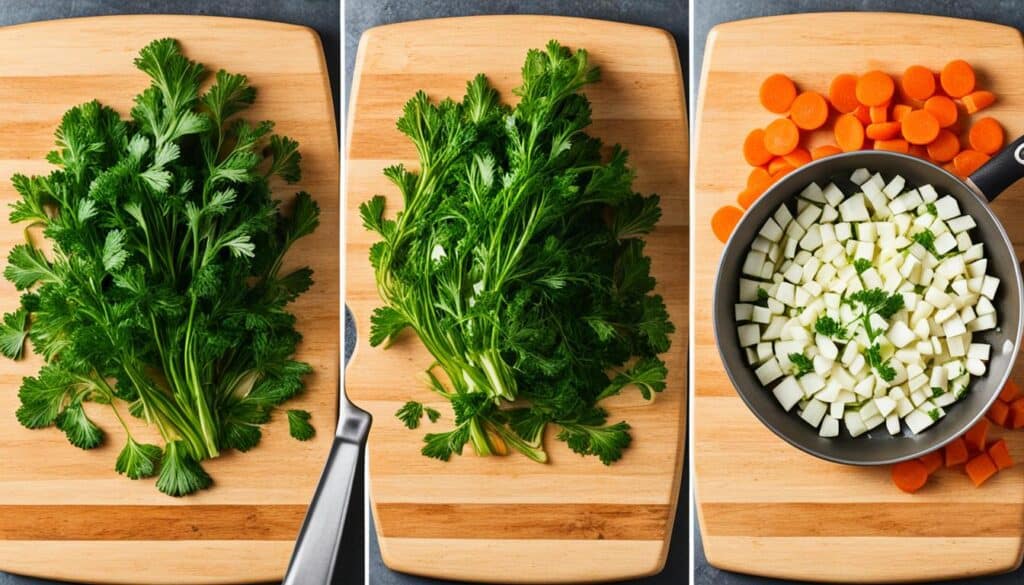Did you know that parsley root, also known as Hamburg root, is not just a garnish for your dishes? This versatile vegetable offers a wide range of health benefits that may surprise you. While its leaves are commonly used as a herb, it is the tuberous root that contains a powerhouse of nutrients, making parsley root a valuable addition to your diet.
Unlike its leafy green counterpart, parsley root has a unique flavor profile that combines hints of herbaceous parsley with the texture of carrots and parsnips. It is widely used in European cuisines and can be enjoyed in various ways, from soups and stews to salads and even as a tea or detox ingredient.
Key Takeaways:
- Parsley root, also known as Hamburg root, is a versatile vegetable with a unique flavor profile.
- It is rich in essential nutrients, including vitamins, minerals, and antioxidants.
- Parsley root has potential health benefits, such as reducing inflammation and supporting the detoxification process.
- It can be incorporated into various dishes, both raw and cooked, to enhance flavor and nutritional value.
- While generally safe to consume, some individuals may experience allergic reactions or should exercise caution due to certain medical conditions.
Nutritional Profile of Parsley Root
Parsley root is not only a flavorful addition to your meals but also packs a punch when it comes to nutrition. This versatile vegetable is bursting with essential vitamins, minerals, and antioxidants that contribute to a well-rounded diet.
Let’s take a closer look at the nutritional breakdown of parsley root:
| Nutrient | Amount per 3.5 oz (100g) serving |
|---|---|
| Calories | 55 |
| Carbohydrates | 12g |
| Fiber | 4g |
| Protein | 2g |
| Vitamin C | 55% of DV |
| Vitamin B9 (Folate) | – |
| Potassium | – |
| Magnesium | – |
| Zinc | – |
| Phosphorus | – |
| Iron | – |
In addition to these macronutrients, parsley root is also rich in antioxidants such as myristicin, apiol, and vitamin C, which contribute to its potential health benefits.
The Antioxidant Power of Parsley Root
Parsley root is a rich source of antioxidants, which play a crucial role in protecting the body against oxidative stress and preventing cellular damage. The primary antioxidants found in parsley root include myristicin, apiol, and vitamin C. These compounds have been shown to exhibit significant antioxidant activity, contributing to the potential health benefits associated with parsley root.
Antioxidant activity in parsley root:
- Myristicin: Myristicin is a natural compound found in parsley root known for its potent antioxidant properties. Studies have indicated that myristicin may help reduce inflammation and combat oxidative stress in the body.
- Apiol: Apiol is another antioxidant compound present in parsley root. It has been associated with anti-inflammatory effects and may help protect against chronic diseases.
- Vitamin C: Parsley root is particularly rich in vitamin C, an essential nutrient that acts as a powerful antioxidant. Vitamin C helps neutralize free radicals and supports the immune system.
The antioxidant activity of parsley root helps reduce inflammation and fights against free radicals, which can cause damage to cells and contribute to the development of chronic diseases. Including parsley root in your diet can provide a natural and delicious way to enhance your overall health and well-being.
Anti-Inflammatory Effects of Parsley Root
Parsley root possesses remarkable anti-inflammatory properties, making it a valuable addition to a well-rounded diet. This vegetable contains compounds such as myristicin, apiol, and furanocoumarins, which have been proven to exhibit anti-inflammatory effects. These compounds work together to reduce inflammation in the body and alleviate symptoms of chronic conditions.
Moreover, parsley root is abundant in vitamins and minerals that further contribute to its anti-inflammatory effects. Vitamin C, zinc, and magnesium found in parsley root play a crucial role in regulating the body’s inflammatory response. By incorporating parsley root into your meals, you can help reduce inflammation and potentially prevent the development of chronic diseases such as heart disease, cancer, and osteoporosis.
| Compound | Anti-Inflammatory Effect |
|---|---|
| Myristicin | Reduces inflammation in the body |
| Apiol | Helps alleviate symptoms of chronic conditions |
| Furanocoumarins | Contributes to the anti-inflammatory properties of parsley root |
The vitamins and minerals in parsley root also play a vital role in maintaining overall health and well-being. Vitamin C acts as a powerful antioxidant, protecting cells from damage and reducing inflammation. Zinc and magnesium are essential for a properly functioning immune system and play a key role in preventing excessive inflammation.
I have personally experienced the anti-inflammatory effects of parsley root. By incorporating it into my meals, I’ve noticed a significant reduction in inflammation and an improvement in overall well-being. It’s truly remarkable how a simple vegetable can have such profound health benefits.
By embracing the anti-inflammatory properties of parsley root and combining it with a balanced diet rich in other nutrient-dense vegetables, you can take proactive steps towards reducing inflammation and promoting long-term health. So why not explore different recipes and get creative with parsley root in your meals?
Detoxification Benefits of Parsley Root
Parsley root plays a vital role in aiding the body’s detoxification process, specifically in the liver. The liver contains enzymes responsible for eliminating toxins that we may acquire through medications, food, or environmental exposure. That’s where parsley root steps in as a natural helper.
Studies have shown that parsley-root juice can stimulate the liver’s production of glutathione and other detoxification enzymes in its tissue, as demonstrated in a study conducted on mice. Glutathione is an antioxidant that plays a critical role in the detoxification process by binding to harmful substances and aiding in their removal from the body.
While this research is promising, further studies are necessary to determine the specific detoxification benefits of parsley root in humans.
Adding parsley root to your diet can be a simple yet effective way to support your liver health and optimize your body’s natural detoxification processes.
Boosting Immunity with Parsley Root
Parsley root is an excellent addition to a diet aimed at bolstering the immune system. It contains high amounts of vitamin C and fiber, both of which are essential for immune health.
Vitamin C plays a vital role in supporting the immune system by helping fight off foreign bacteria and reducing inflammation. It acts as an antioxidant, neutralizing free radicals that can damage cells and weaken the immune response. By including parsley root in your diet, you can increase your intake of vitamin C and strengthen your body’s defense against infections and diseases.
Fiber, another essential nutrient found in parsley root, plays a crucial role in supporting immune function by promoting the growth of healthy bacteria in the gut. A healthy gut microbiome is linked to a robust immune system and can help protect against infections and promote overall health.
Why Vitamin C is Important for Immune Health
Vitamin C is a powerful antioxidant that helps protect immune cells from damage caused by free radicals. It also plays a key role in the production of white blood cells, which are essential for fighting off infections. Additionally, vitamin C enhances the activity of natural killer cells, which are responsible for identifying and destroying harmful cells, including those that can cause cancer.
By incorporating parsley root into your diet, you can increase your vitamin C intake and give your immune system an extra boost.
The Role of Fiber in Immune Health
Fiber plays a vital role in maintaining a healthy gut and supporting immune function. It acts as a prebiotic, providing nourishment for the beneficial bacteria in your gut. These bacteria, also known as probiotics, play a crucial role in immune function, helping to protect against harmful pathogens and promoting a balanced immune response.
Parsley root is a good source of dietary fiber, with each serving contributing to your daily fiber intake. By including parsley root in your diet, you can support the growth of healthy bacteria in your gut and enhance your immune system’s ability to defend against infections.
Ways to Enjoy Parsley Root for Immune Health
Parsley root can be incorporated into your diet in various ways to support immune health:
- Add raw parsley root slices to salads for a crunchy texture and a boost of immune-boosting nutrients.
- Include parsley root in soups and stews to add flavor and nutrition.
- Roast parsley root with other root vegetables for a delicious and immune-boosting side dish.
- Blend parsley root into smoothies for a nutrient-packed boost.
- Use parsley root as a topping for roasted meats or vegetables.
By incorporating parsley root into your diet, you can take advantage of its high vitamin C content and fiber to support a healthy immune system. Whether enjoyed raw, cooked, or blended into various dishes, parsley root is a versatile and beneficial addition to any immune-boosting diet.
Parsley Root and its Potential Anticancer Properties
Research suggests that parsley root may have potential anticancer properties. The fiber content in parsley root is associated with a reduced risk of various types of cancer, including colon, ovarian, head, and neck cancers.
In addition to its fiber content, parsley root is rich in flavonoids, which are plant compounds known for their antioxidant and anti-inflammatory properties. Flavonoids have been shown to inhibit the growth of cancer cells and reduce the risk of cancer development.
One study found that parsley root extract inhibited the growth and proliferation of breast cancer cells in a laboratory setting. This suggests that parsley root may have a role in preventing breast cancer or slowing its progression.
While these findings are preliminary and mainly based on laboratory studies, they provide valuable insights into the potential anticancer properties of parsley root. Further research, particularly in human studies, is needed to fully understand the effects of parsley root on cancer prevention.
“Research suggests that parsley root may have potential anticancer properties. The fiber content in parsley root is associated with a reduced risk of various types of cancer, including colon, ovarian, head, and neck cancers.”
Flavonoids in Parsley Root
Parsley root is rich in flavonoids, a group of plant compounds that have been extensively studied for their potential health benefits. Flavonoids are known for their antioxidant, anti-inflammatory, and anticancer properties.
Several flavonoids have been identified in parsley root, including apigenin, rutin, and luteolin. These compounds have been shown to inhibit the growth of cancer cells, reduce inflammation, and protect against DNA damage caused by free radicals.
One study published in the Journal of Medicinal Food found that apigenin, a flavonoid present in parsley root, inhibited the growth of human breast cancer cells. Another study published in the Journal of Nutrition and Cancer demonstrated the anticancer effects of rutin, a flavonoid found in parsley root, on colon cancer cells in vitro.
The flavonoids in parsley root work synergistically with other compounds to provide potential health benefits, including cancer prevention. Including parsley root in a balanced diet that is rich in a variety of fruits and vegetables can enhance your overall intake of flavonoids and support your body’s natural defense against cancer.
Parsley Root Fiber and Cancer Prevention
Fiber is known for its role in digestive health, but it may also have a protective effect against cancer. Parsley root is a good source of dietary fiber, which may contribute to its potential anticancer properties.
The fiber in parsley root has several mechanisms that can help reduce the risk of cancer. First, fiber promotes regular bowel movements, preventing the buildup of waste and harmful substances in the colon. This reduces the exposure of cells in the colon to toxins and potential carcinogens.
Second, fiber acts as a prebiotic, promoting the growth of beneficial bacteria in the gut. These gut bacteria produce short-chain fatty acids, which have been shown to protect against colorectal cancer.
Lastly, fiber can help control weight and reduce the risk of obesity, a known risk factor for several types of cancer, including breast, colon, and ovarian cancers.
Overall, the fiber content in parsley root, along with its flavonoids and other beneficial compounds, make it a potential ally in cancer prevention. Including parsley root in your diet can contribute to a well-rounded approach to reducing the risk of cancer.
Table:
| Types of Cancer | Potential Protective Effects |
|---|---|
| Colon Cancer | Fiber in parsley root promotes regular bowel movements, reducing exposure to toxins and potential carcinogens in the colon. |
| Ovarian Cancer | Fiber in parsley root helps control weight and reduce the risk of obesity, a known risk factor for ovarian cancer. |
| Head and Neck Cancers | Flavonoids in parsley root, such as apigenin and luteolin, have been shown to inhibit the growth of cancer cells in laboratory studies. |
| Breast Cancer | Flavonoids in parsley root, such as apigenin and rutin, have been found to inhibit the growth of breast cancer cells in laboratory studies. |
Incorporating Parsley Root into Your Diet
Parsley root is a versatile vegetable that can add a unique flavor and nutritional boost to your meals. There are several ways you can incorporate parsley root into your diet:
1. Raw
Parsley root can be enjoyed raw, adding a refreshing and crunchy element to your dishes. Slice it into sticks or shred it to use in salads or as a nutritious vegetable dip.
2. Cooked
Parsley root can be cooked in various ways to bring out its flavors and textures. Here are a few cooking methods to try:
- Steam: Steam parsley root to preserve its nutrients while maintaining a tender texture.
- Roast: Roasting parsley root with olive oil and your favorite seasonings enhances its natural sweetness and creates a delicious side dish.
- Sauté: Sauté parsley root with other vegetables or protein for a flavorful addition to stir-fries or pasta dishes.
- Add to soups and stews: Parsley root can be chopped and added to soups and stews to impart its earthy flavor and add a nutrient boost.
- Use as a bed for roasts or vegetable bakes: Place roasted meats or vegetables on a layer of parsley root for added flavor and presentation.
3. Garnish and Pesto
The tops of parsley root can be utilized as a garnish to add a fresh and vibrant touch to your dishes. You can also transform the tops into a flavorful pesto to serve with pasta, grilled meats, or as a dip.
Here’s a simple parsley root pesto recipe:
- Ingredients:
- – 1 cup parsley root tops, washed and dried
- – 1/2 cup toasted pine nuts
- – 2 cloves garlic
- – 1/2 cup grated Parmesan cheese
- – 1/2 cup extra-virgin olive oil
- – Salt and pepper to taste
- Combine the parsley root tops, toasted pine nuts, garlic, and Parmesan cheese in a food processor.
- Pulse until well combined.
- Gradually add the olive oil while pulsing until the pesto reaches your desired consistency.
- Season with salt and pepper to taste.
- Serve the parsley root pesto over pasta, grilled meats, or as a dip.
By exploring different cooking methods and recipes, you can make the most of parsley root’s unique flavors and reap its health benefits.
Parsley Root as a Nutrient-Dense Ingredient
Parsley root is not only a flavorful addition to your meals but also a nutrient-dense ingredient that offers a wide range of essential vitamins and minerals. Despite being low in calories, parsley root is packed with nutrients, making it an excellent choice for various dietary needs, including weight loss and nutrient-rich diets.
With its versatility in cooking, parsley root can be easily incorporated into a variety of dishes, enhancing both their flavor and nutritional profile. Whether you’re looking for a low-calorie option or aiming to boost the nutrient density of your meals, parsley root is a fantastic choice.
Benefits of Parsley Root
Parsley root is known for its abundance of nutrients, which include:
- Vitamin C: Provides antioxidant protection and supports immune health.
- Potassium: Essential for maintaining healthy blood pressure levels.
- Magnesium: Important for bone health and muscle function.
- Folate: Plays a crucial role in DNA synthesis and cell division.
These nutrients, combined with others present in parsley root, contribute to its nutrient density and various health benefits.
| Nutrient | Amount per 100g |
|---|---|
| Vitamin C | 55% DV |
| Potassium | 10% DV |
| Magnesium | 6% DV |
| Folate | 6% DV |
As shown in the table above, parsley root is rich in vitamin C, providing 55% of the recommended daily value per 100 grams. This nutrient density makes parsley root an excellent addition to nutrient-rich diets.
The Bottom Line on Parsley Root
Parsley root is a highly nutritious and versatile vegetable that offers numerous health benefits. Rich in essential vitamins, minerals, and antioxidants, parsley root supports overall health, including immune function, bone health, and heart health. Consuming parsley root can reduce inflammation, support the detoxification process, and potentially prevent the development of chronic diseases.
With its low calorie count, parsley root is a great addition to a variety of diets. Whether enjoyed raw or cooked, parsley root adds flavor and nutritional value to a wide range of dishes. Including parsley root in your diet is easy and beneficial for your well-being.
Summary of Parsley Root Benefits:
- Rich in essential vitamins, minerals, and antioxidants
- Supports immune function, bone health, and heart health
- Reduces inflammation
- Supports the detoxification process
- Potentially prevents the development of chronic diseases
- Low in calories
- Versatile and flavorful addition to a variety of dishes
By incorporating parsley root into your diet, you can enjoy its numerous benefits while enhancing the taste and nutritional profile of your meals. Whether you’re looking to improve your overall health or simply add a nutritious ingredient to your favorite recipes, parsley root is a fantastic choice.
Potential Side Effects of Parsley Root
While parsley root is generally safe to consume, it’s important to be aware of potential side effects and exercise caution under certain circumstances.
Allergic Reactions to Parsley Root
Some individuals may experience allergic reactions to parsley root, especially if they have known allergies to plants in the Apiaceae family, such as celery or carrots. These allergies may manifest as skin rashes, itching, or swelling. If you are allergic to these related plants, it’s advisable to approach parsley root with caution and monitor your body’s response when consuming it.
Caution in Certain Medical Conditions
Parsley root contains a high amount of vitamin K, which is essential for blood clotting. While this is generally beneficial, individuals with certain medical conditions, such as kidney disease or bleeding disorders, may need to be cautious when consuming parsley root. The high vitamin K content can interfere with medication or treatment plans, so it’s important to consult with a healthcare professional before incorporating parsley root into your diet if you have these conditions.
As always, it’s recommended to consult with a healthcare professional before making any significant changes to your diet or if you have specific health concerns.
Conclusion
In summary, parsley root is an incredibly versatile and nutrient-dense vegetable that provides a wide range of health benefits. Its rich nutritional profile, including essential vitamins and minerals, makes it an excellent addition to a balanced diet. With its unique flavor that combines hints of herbaceous parsley with the texture of carrots and parsnips, parsley root can add depth and complexity to various dishes.
Not only is parsley root packed with antioxidants that help protect the body against oxidative stress, but it also exhibits anti-inflammatory effects due to its compounds such as myristicin, apiol, and furanocoumarins. Additionally, parsley root supports the process of detoxification in the liver, aids in boosting the immune system, and has potential anticancer properties.
It’s important to note that while parsley root offers numerous benefits, it’s essential to be aware of potential side effects, particularly for individuals with specific medical conditions or allergies. Consulting with a healthcare professional is always recommended. Nevertheless, parsley root is a flavorful and nutritious vegetable that can enhance the taste and nutritional value of your meals, making it a valuable addition to your diet.










Leave a Reply